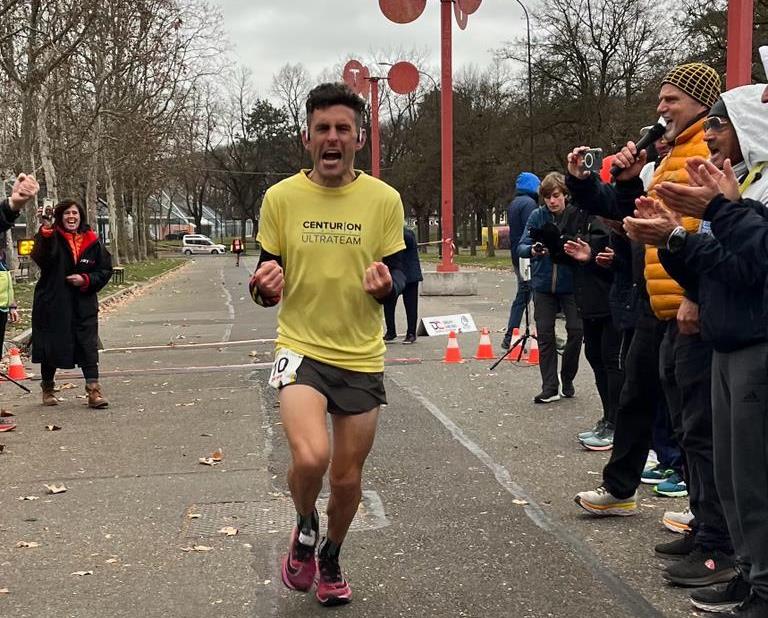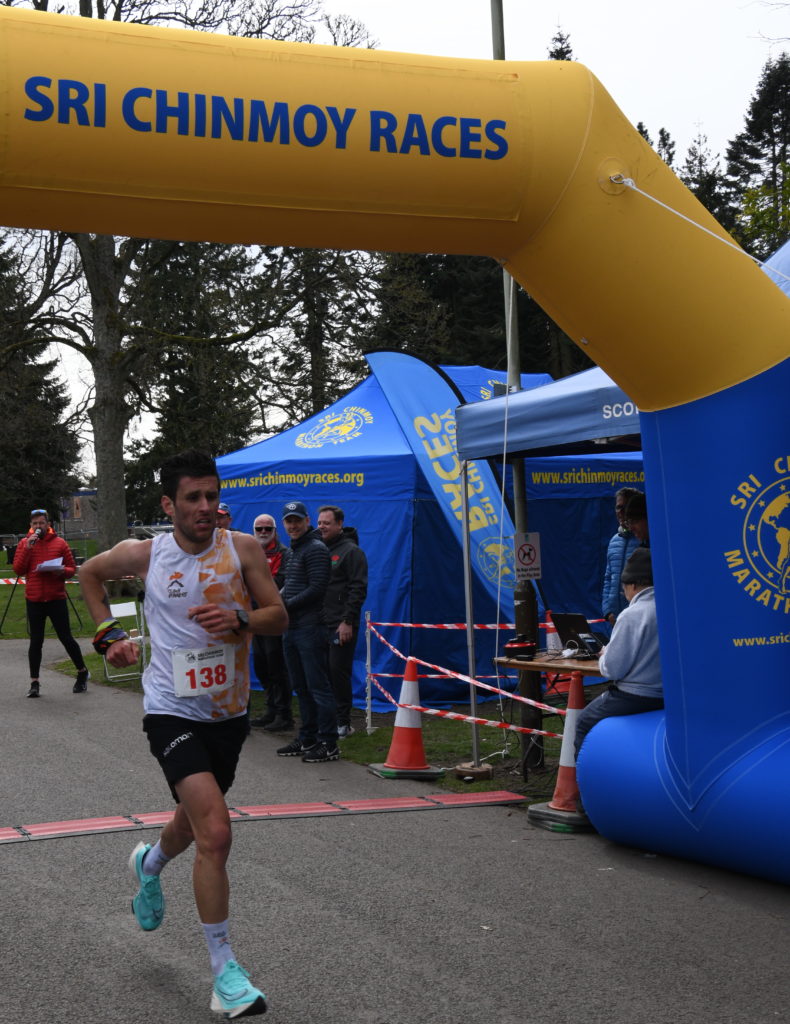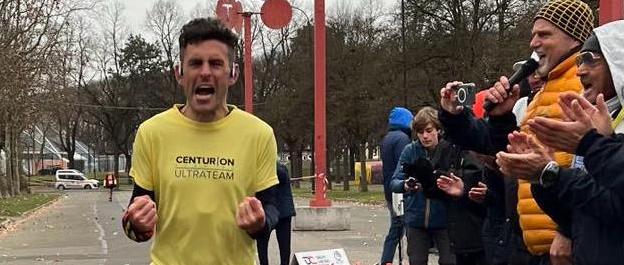Three days after running 172 miles around a park in Turin, I talked with Robbie Britton about his new GB 24-hour record.

Robbie Britton, nears the end of his new Gb 24 hour record run in Turin, Pic via Robbie Britton.
Talking about the race where he set the new GB 24 hour record
Adrian. Three days from your tremendous effort in Turin, how are you feeling? How are the legs, and how is your fatigue generally?
Robbie
I was wondering on Monday how I was ever going to move well again.
It has been a while since I have run over 15 to 16 hours. I think the time you run on broken legs is considerably longer if you go to the end of a 24-hour.
If you were running 100 miles or 100km, you are spending less time in that broken state.
It feels like in the 24-hour, it is exponential. The damage you are doing is considerable in going from 12 to 16 hours to 22-24 hours.
As usual, I put in a couple of quick last laps, which may have put me back a day or two.
Generally, the legs are responding well. I went for a 30-minute walk with the dog yesterday. It’s not often a 14-year-old dog gets to put the hurt on you. It would have been good for Rosa’s self-esteem!
Adrian
I wouldn’t worry too much about those last two fast laps. You get so few opportunities to be where you were. You have to make the most of it. You are probably thinking already, I wonder if I could go further, but efforts like that only come around every so often.
Robbie. The record pace slipped away a little between 12 -18 hours, so from 18 to 24, I had to lift the pace slowly again each lap. Just focusing one lap at a time and building it. (The lap length in Turin was 1.013KM.)
As the record got closer, in the final two hours, I had the energy to push harder, but there was this little fear inside that if I pushed too hard, I could bring on a cramp, or I would take a little stumble and trip. The primary aim was to get the British record. I didn’t want to push for a greater distance and ruin everything. Once the record was there, I blitzed the last 2-3 laps doing 6:15 per mile. I could have gone a little earlier, as we did in Turin.
On my last visit to Turin (World Championships 2015), you will remember once the team medals were secure, I blazed the last hour to go as far as possible.
It wasn’t worth risking that this time. As you say, you rarely get to that point, and it wasn’t worth the risk.
.
Adrian
You ran 261k at those championships in 2015. That was a big breakthrough for you at the time. Then you had injury issues for a few years. How long have you been targeting a return to a Stellar 24-hour?
Robbie
Since that day in 2015! Since about 10 minutes after I finished.
It has always been an absolute dream of mine to go for the British 24-hour record.
If you are asking, when did it become viable again?
Adrian. Yes. That’s more the relevant question.
Robbie
Then probably the last couple of years. After Turin, we had the Albi European champs in 2016. I then had knee surgery shortly afterwards.
Then Belfast world Champs in 2017, where I didn’t perform as expected.
Blood tests after Belfast showed I ran the race with a virus.
After that, the knee continued to be an issue for a while.
After my Wicklow Way run in 2019, I felt pain in two different ways in both legs, which is weird. I was extremely grateful after this weekend when someone asked, ”How are your legs?” I said they both hurt in similar ways. It was a wonderful thing to experience. If they both hurt, it’s fine. If one hurts, it might be an imbalance and you will need to find out what it is.
More recently, I ran Gloucester 24-hour last year. The build-up was the first good block of training I had done in a while.
At Sri Chinmoy 50km at Perth last spring, I ran it off a considerable amount of bike training. The biggest running week I had was about 100km. The majority of the aerobic work was on the bike.

Post Perth, I managed to get some good weeks in before going to Gloucester, and I thought I had a chance of the record. I was on pace for it for 14 hours, but the temperature was about 34 degrees. It was a good learning experience, probably integral, in many ways, in building confidence for last weekend’s race and developing strategies for running in the heat.
It also helped my crew to work with me as a team,
Jamie and Sara-Jane were both at Gloucester. You know how important a good crew is and how you work together and build a relationship.
I then targeted another 24-hour race in December in Sweden.
I think I was fitter then, as I had had a great block of training, but eight days out from the 24-hr in Sweden I had targeted, I got struck with Covid.
I was over it before race day, so we still went, as Jamie and Sarah-Jane were all booked to come and crew too. We figured we could do something there, but my heart rate on race day made it evident it would not have been wise to go on. (Robbie baled after close to 50k.)
So yes, it’s been truncated training for some events and elongated training for the Turin race.
Since Christmas, I had managed a couple of 200km weeks and a couple close to 100 miles.
Last week in Turin, it was 90 % humidity, so my main issue was not overheating.
Adrian. You would have had a plan going into last weekend’s race. Did it go to plan?
Robbie.
The plan was around heart rate, and we planned to keep it around 130-135 beats per minute(bpm) for the first 15-16 hours.
In the first hour with all the excitement and subtle anxiety, my heart rate didn’t drop.
During my lab tests in Liverpool with Jamie, running 13 km an hour or 7.30-minute miles, my heart rate was under 130 beats per minute. In the build-up, most of my 7.30-minute miles were under 130 bpm.
In Turin last week, it quickly stabilised around 140 at that pace, then went above 140.
I think it peaked at 150 in the hottest part of the day, which wasn’t too hot, but when you are running, you generate quite a bit of heat, and I am a de facto oven in that regard.
My early effort and pace were where we wanted to be, and I let the race control me more than I should have.
In hindsight, which is always a wonderful thing, it would have been better to have gone a little slower and then pick it up.
I should also have done more to cool myself with sponging and icy water.
As for my hydration, we stepped back a little, and the plan did change.
We were aiming for 500-600ml of fluid an hour. However, if we got 350 ml an hour, that was a decent amount, as I was passing clear water, regularly. My mouth was dry, and my thirst was high, but I seemed to be drinking enough.
During the race, I lost half a kilo, so no significant weight loss.
We think that was all down to humidity.
I had 94 grams of carbs an hour and a lot of Precision Hydration products. Gels, chews and their drink mix which has the right levels of sodium for me.
I ate small portions of rice, with some jam for proper food, a bit of pasta and a bag of sweets.
Talking on the history of the GB 24 hour record.
Adrian. That’s a good catch-up on the race itself.
Looking at the history of the record. When Dave set that, you weren’t even born! ( Dave is Dave Dowdle, the previous record holder.)
(You can read, in this post, more details of Robbie’s run and the progression of the GB record.)
Robbie.
Thats right. The record was older than I was. I spoke to Dave Dowdle yesterday. Pam Storey Crawley 12/24 hour organiser) gave me his home number, so I called him on the off chance. I had never spoken to him before. He was at home. We had a great chat for a few minutes. He said, that when he set his record, he just drank water and tea with honey, which is great.
Adrian. Yes. Different times. I recall crewing Donald on some of his big efforts, and it all seemed very simple then, but effective.
Robbie.
Yes! There have been amazing advances in technology and nutrition.
The shoes certainly help and do make a difference. In terms of sheer numbers, I would like to have put more daylight between my distance and Dave’s distance that overshot the influence of the shoes, but I think I haven’t quite done that yet.
I think, if back in 1982, Dave had the Nike shoes I wore this weekend, he would have gone further than 277km. It’s disingenuous not to look at the impact of that.
I think it’s important to highlight the difference that shoe technology and nutrition have made to longer distances.
Adrian. Which shoes didyou wear in Turin for your GB record?
Robbie. Nike Alpha Fly. The original’s not the latest model. I had a pair of Hoka as back up, but didn’t need them
Adrian. Dan Lawson had a great run in Verona last year and came close to Dave’s distance. Don Ritchie gave it a go on a few occasions but, on his admission, never quite got the nutrition or pacing right at 24 hours. Mark Pickard as well.
Do you think your record will last for 40 years?
Robbie. I hope not. NO!
A couple of other people have said that to me already. I want to break it again in my lifetime, let alone other people trying to break it. I think we have a good squad of current and upcoming runners taking 24 hours seriously. You have Damian Carr, Paul Maskell, Alex Whearity, Danny Hawkins and others with potential, all trying 24 hours as an event. It was great to see Dan come back last year after a break.Already this year he has PB’s at shorter distances, 5k and half marathon. If he stays fit and healthy, I think he has another big one in him as well.
Adrian
I was lucky to know some of the runners from previous years, and people like Mark Pickard, Don Ritchie and all the Gloucester crew raced a lot of ultras in their day. Compared to today’s runners, do you think they overraced? With the result that some of their performances and their longevity suffered as a result?
Robbie
Definitely. With the odd exception, not many seemed to keep running well into their forties and fifties.
Also, if you are running hundreds of miles and are fatigued, you carry that fatigue into a race. You might get away with it in a shorter race, but in a 100-mile or a 24-hour, that’s a long time to be running on fatigued legs and possibly a fatigued system.
You can last longer with good conditioning, but my longest run in the build-up to Turin was 2 hours and 40 minutes, maybe 22-23 miles.
I ran almost 50k in the race in Sweden before Christmas but at a low race pace. Before that, my longest run last year was around 3 hours.
If you love racing, race more over shorter distances, and pick the long races you want to do well at.
Adrian.
Thanks so much for your time. Well done on a tremendous performance again. Keep recovering well.
Robbie. Thanks. Catch up again soon.
Gloucester Athletic Club Ultra History
Ultra enthusiasts may be interested in the ultra history of Gloucester AC in the late 1970,s and early 1980’s. Some remarkable and enthusiastic exploits from Dave Dowdle , Martin Daykin, Chris O’Carroll and others. Includes a report of the 1982, 24 hour record by Dave Dowdle.
PLEASE SHARE!
If you have enjoyed this post, do see our other ones HERE
If you are inspired by this or think someone else you know will be, please do what you have to do by sharing. You all know how these things work by now:-) You can also follow me on Twitter and Instagram @tarittweets
